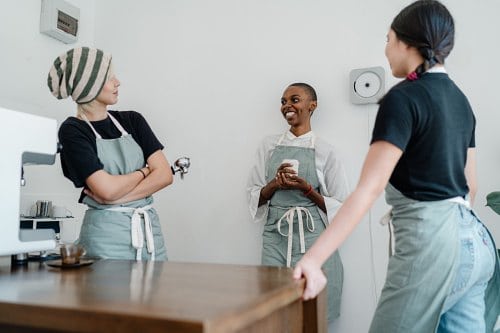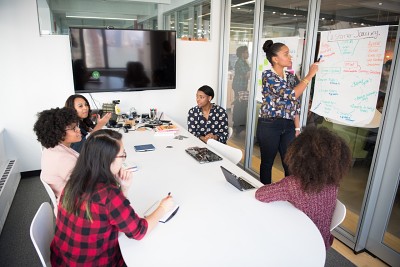9 Great Ways to Improve Interpersonal Skills
Interpersonal skills are key in getting us to network and relate with others in a constructive and positive manner. It is Our ability to relate well with other people and generate positive results from these connections.
In this article, we will discuss 9 Great Ways to Improve Interpersonal Skills and have in the next line them mentioned in a list.
- Verbal Communication
- Non-verbal communication
- Listen
- Questioning
- Good manners
- Troubleshooting
- Social Awareness
- Personal Management
- Be attentive to details
9 Great Ways to Improve Interpersonal Skills
1. Verbal Communication
Communicate, which means say what we mean, avoid using analogies before knowing what the problem is. The first step is to speak without haste and with consideration, validating the other’s opinions concerning their statements.
Make it a two-way conversation; remember that the goal here is neither to judge or escalate anybody; we are just talking to get some behavior changes.
According to William Glasser, we learn seventy-five percent of the time chatting, classifying, defining, discussing themes with others, and only ten percent reading.
TIPS ON HOW TO IMPROVE VERBAL COMMUNICATION:
- Go hang out with some friends;
- Catch some movies, go and sit in a restaurant or make a home program;
- Go to reading club’s so you can read and discuss in a group.
2. Non-verbal Communication
Body language can speak more than the words themselves. Facial expressions, eye contact, posture, voice, and gestures are some examples of non-verbal communication capable of revealing their true intentions, whether good or bad. Body language contributes to give credibility to the message.
| Types of non-verbal communication | Description | Forms of non-verbal communication | Description |
| Kinesthetic | Regarding body language, such as facial expressions, look, gestures and posture. | Facial expressions | It concerns how our face conveys our emotional states. It can often be used as a means of confirmation. |
| Paralyzing | It can be related to the sounds emitted and the mouth gestures, for example, laughter and yawning. | Appearance | Regarding the way you dress and the influence you have in the construction of your first impression for the other |
| Proxemic | It is related to physical space, the distance between people, and the use of space available to communicate. | Gestures | Usually, they occur spontaneously when we try to explain something and make use of our hands, for example. |
| Posture or body expressions | It’s related to our body positions. |
TIPS ON HOW TO IMPROVE NON-VERBAL COMMUNICATION:
- Act natural there is no need to copy other people body language;
- Be aware of your movements, so you know later the meaning of them;
- Keep eye contact while talking with anyone; it shows confidence.
3. Listen
For those who want to do well in their studies, to progress professionally, listening is the best option, and there will be a need for practice. In the days of globalization, fierce competition, people hear little and want to talk more than listen.
Knowing how to listen is an art, facilitates understanding, and makes communication more efficient. A lot of people just hear and do not listen.
Hearing means only hearing the sound that the ear picks up, with no attention and no interpretation of what is being listened to since it does not matter; otherwise, listening means listening carefully, understanding, and understanding what matters.
| Define a goal | e.g., read more books, take more notes. | |
| Tips on How to Listen | It is not necessary to stick only to an item of learning, let the creativity flow, and seek knowledge | e.g., music, films, and series, articles, podcasts. |
| Find a person who understands the subject to be learned | e.g., seek the help of a teacher, a writer, a friend who has more knowledge, or a family member. |
4. Questioning
Questioning is a great way to start a conversation. However, it is about the quality of the questions, which should prompt the group to think about new ways to solve a problem.
When the right questions are asked, efficiency improves so that the leader can draw up action plans that are more grounded and appropriate to his team’s reality.
A person may not even be an expert on a particular subject, but it is possible to stimulate any kind of dialogue by asking the right questions.
TIPS ON HOW TO MAKE QUESTIONS:
- In the construction of the question, give preference to those that are considered more powerful, which use “Why?” and “How?” and “What?”. The less powerful use “Who?” and “When?” and “Where?” and “What?”;
- Try to specify it as much as possible, making it precise and without scope for other interpretations or misunderstandings.
5. Good manners
Unfortunately, a person who does not have good manners is considered less intelligent. In the business world, this also happens. Therefore, knowing whether to behave can avoid some obstacles in communication.
Good manners have a direct impact on how other people see or treat you. If you are educated, people will see you as mature and responsible, respect your opinions, and listen to you more.
TIPS ON HOW PRACTICE GOOD MANNERS:
- Be tolerant sometimes it’s challenging to accept some ideas and worldviews that are entirely different from ours;
- Don’t take it all personally.
6. Troubleshooting
Problem-free days to solve are rare. A person who can solve problems efficiently (the keyword is not “fast”), that is, identifying the problem, understanding it, examining the possibilities, proposing a strategic system, and putting the plan into practice; will undoubtedly be valuable to your company.
TIPS ON HOW to BEHAVE DURING A TROUBLESHOOTING:
- The sooner we face the situation, the smaller its negative consequences.
- It is, therefore, essential to develop the capacity to resolve outstanding issues. In this sense, it is necessary to create, widely, their emotional intelligence and know the best ways to apply it in everyday life;
- Meditate more; people that meditate stress less.
7. Social Awareness
Social sensitivity is an individual’s ability to identify, perceive, and understand signs and contexts in social interactions. It means to what extent you understand others’ feelings and thoughts and to what extent you know the general knowledge of social norms.
By applying the concept of social sensitivity, people can know each other’s feelings. The fundamental principle of social sensitivity lies in the broad knowledge of social norms.
TIP-ON HOW to BECOME SOCIAL AWARE:
- Be in tune with the people around you is vital;

8. Personal management
Just as it is crucial to know how to control your own emotions, personal management is, therefore, a set of practices to maximize human behaviors’ potential.
It guarantees that all our needs will be met and that they will be within the positions and functions that we can perform. Suppose we are unable to have this control. In that case, we will likely have problems managing our team, which can generate internal conflicts, high turnover of people, and consequently low profitability and cancellation of corporate contracts.
TIPS ON HOW TO PRACTICE PERSONAL MANAGEMENT:
- Do online courses;
- Hangout with a variety of social groups;
- Read all kinds of books we can.
9. Be attentive to details.
When we pay attention to details, we analyze more profound things that aren’t even spoken.
Christof Chartier, CEO, C.M. Chartier Contracting, once said:
“When I meet new people, I try to find clues about them. Notice what they’re drinking, for example, to start a conversation. Notice when someone prefers red wine, which can lead to a discussion about a favorite local winery, leading to a much more personal and memorable conversation. A personal connection takes you a lot further than just talking about time.“
TIPS ON HOW PAY ATTENTION TO DETAILS:
- Make lists about things that interest you and investigate;
- Avoid doing multiple things at the same time;
- Start noticing utility on little things like a window. For example, how can a window make a difference?
Conclusion
Developing interpersonal skills can be the turning point of a career. Successful people are marked by building concrete bridges around them, and, in the overwhelming majority of cases, this involves improving the relationship with splits the workday with them.
References and Further Reading
10 Excellent Ways to Develop Interpersonal Skills at Work.EDUCBA
Nine Tips for Improving Your Interpersonal Skills. KELLY.
Teal Swan Podcast. Google Podcasts








